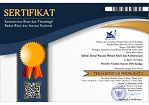Kontekstualisasi hukum murtad dalam perspektif sejarah sosial hadis
Abstract
Apostasy is a conversion of the original Muslim, abandoning the faith and following other religion
than Islam. In Islamic law, the perpetrator of apostasy will receive punishment of execution according
to the jurists’ consensus. The consensus is understood from some hadiths containing the command to
execute the apostates and the fact of execution of apostates in the prophetic period of Muhammad saw.
This article analyzes hadiths about the problematics of apostasy from the used terms, the background,
and the contexts of the existance of command to execute apostates. The hadiths about apostasy were
analyzed through socio-historical view of hadiths by the theory of compromise towards the seemingly
contradictive hadiths. The result of analysis shows that the background of execution of apostates
tended to the war situation in that period and the social crimes committed by the apostates, indicated by
the existance of fact that the apostates committing religious crime, changing verses of al-Quran, received
amnesty and were not executed. At present time, execution of apostates is a lively issue of debate. The
result of analysis can provide other alternatives since apostate execution is not the only right way and it
cannot be applied in any countries.
than Islam. In Islamic law, the perpetrator of apostasy will receive punishment of execution according
to the jurists’ consensus. The consensus is understood from some hadiths containing the command to
execute the apostates and the fact of execution of apostates in the prophetic period of Muhammad saw.
This article analyzes hadiths about the problematics of apostasy from the used terms, the background,
and the contexts of the existance of command to execute apostates. The hadiths about apostasy were
analyzed through socio-historical view of hadiths by the theory of compromise towards the seemingly
contradictive hadiths. The result of analysis shows that the background of execution of apostates
tended to the war situation in that period and the social crimes committed by the apostates, indicated by
the existance of fact that the apostates committing religious crime, changing verses of al-Quran, received
amnesty and were not executed. At present time, execution of apostates is a lively issue of debate. The
result of analysis can provide other alternatives since apostate execution is not the only right way and it
cannot be applied in any countries.
Keywords
Apostasy; Execution; Amnesty; History; Social context
Full Text:
PDFDOI: https://doi.org/10.18326/ijtihad.v14i1.21-39
Refbacks
- There are currently no refbacks.
Ijtihad: Jurnal Wacana Hukum Islam dan Kemanusiaan by http://ijtihad.iainsalatiga.ac.id/ is licensed under a Creative Commons Attribution-ShareAlike 4.0 International License







